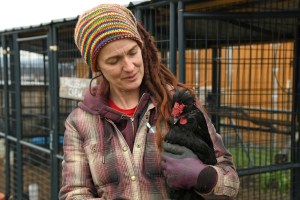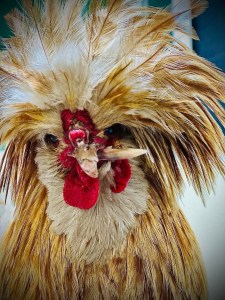Rogue Valley rooster rescuers say, ‘No más!’ as backyard flocks grow
Published 12:18 pm Thursday, April 17, 2025



Local animal rescue operations and farm stores encourage would-be bird buyers to do their research before purchasing birds
With spring in full bloom and egg prices on the rise, the appearance of fluffy baby chickens under warming lights at local farm stores can easily tempt residents to consider raising a backyard flock.
Unfortunately, most would-be chicken farmers pick out baby birds before researching proper care and — perhaps most importantly — understanding regulations for chickens and roosters in the cities in which they live.
Hadassah DeJack-Reynolds, executive director of Tikkun Olam Farm Sanctuary, says the phone calls are more predictable during springtime than photo opps with an imaginary Easter bunny.
Sadly, the calls for help — and accompanying social media posts about unwanted birds — continue all year.
“In one month, I got calls for 85 roosters,” DeJack-Reynolds said.
“I’ve had them dumped on Wagner Creek. I rappelled down a cliff rescuing roosters that were dumped. I even had a TV station that told me to come get a rooster. … We have 105 birds here, and 18 are roosters.”
DeJack-Reynolds, who founded her Talent-based sanctuary in 2017, said she’s somehow become the place where people call to report their baby chickens didn’t end up as hens.

Tikkun Olam Farm Sanctuary director Hadassah DeJack-Reynolds holds a rooster named Roy. Buffy Pollock / Rogue Valley Times
Her farm residents include rescues who have recovered from injury and feathered occupants with an array of birth defects, such as a rooster named Marco Pollo, born with a cross beak who requires twice-daily hand feedings in order to survive.
DeJack-Reynolds said local rescues and animal sanctuaries struggle to keep up with the requests to take on additional birds and that education prior to purchase would go a long way.
Also to consider are regulations for keeping chickens in various municipalities around the region that often prohibit certain types of animals entirely.
In the Rogue Valley, nearly all cities allow hens — usually with restrictions on how many — but prohibit roosters. Additional restrictions could come from homeowners’ associations, which have their own rules beyond local cities.
DeJack-Reynolds said she recently assisted a Medford woman who had three roosters dumped on her property in a semi-rural area. The woman’s property was grandfathered in for allowing farm animals, so she planned to let them stay. Noise from the roosters prompted phone calls from neighbors and a visit from a code enforcement officer.
“They told her they had to kill them, and they wanted to watch her do it,” DeJack-Reynolds said.
“They can’t make you kill an animal. That’s obscene. Thankfully, it ended up working out that she found somebody who could take them.”
While most farm store shoppers delight at the sight of shiny bins and warming lights each spring with baby chicks huddled inside, DeJack-Reynolds said it’s a frustrating time of year for animal sanctuaries like hers.

Marco Pollo, a rooster who lives at the Tikkun Olam Farm Sanctuary, has a cross beak and must be hand fed twice daily. The sanctuary located in Talent often receives calls for unwanted roosters and birds with health issues which are difficult to care for. Buffy Pollock / Rogue Valley Times
One local farm store recently said some 8,000 chicks were on order. Some batches of birds are sexed, while others, known as a “straight run,” promise a 50-50 chance of a rooster.
“If the average number of chicks sexed incorrectly is 20%, you’re looking at 1,600 roosters from that 8,000,” she said.
“If you get a straight run, there’s a 50-50 chance of getting a boy or girl. So you need to know whether you live somewhere that you can keep a rooster.”
Leslie Powers, an employee at the Central Point Grange Co-op, said farm store employees work to ensure anyone purchasing birds understands basic care.
“The rule of thumb is 3-foot-by-3-foot square area for a chicken to live, but I think it should be more than that. For three chickens you want to have a run for them, and you don’t want to have them just live in a little house. Chickens are very dirty and smelly to keep,” she said.
“You get all kinds of people that think they can get them and put them into a chicken coop and not realize they have to put them under lights, things like that. There’s more to it than feeding them and collecting eggs.”
Powers said misinformation often results in a poor outcome for birds. A man recently purchased several chicks and told co-op employees he was certain he “knew how to raise them.”
“He said, ‘I bought chickens from Medford and they’re all dying and I don’t know why,’” Powers said.
The man, it turned out, was only feeding “grit,” a coarse supplement added to food to help with digestion and offer added nutrients for stronger eggshells.
“There’s no nutritional value in that. I told him, ‘You starved them to death,” Powers said.
“People need to do the research on how to take care of them, how to feed them, and they need to have an adequate area for them to live. Those are the main things.”
For those who purchase birds expecting hens and end up with roosters, Powers suggested flyers on community boards at local farm stores. On social media, special groups have been set up, such as “Rogue Valley ONLY Rooster Rehoming,” simply for the purpose of rehoming roosters.
“There are always people wanting roosters for their flock, and they don’t know how to buy one that will end up being a rooster, so you can find homes for them,” she said.
“We do try to let people know, though, ‘If you’re in town, and you end up getting a rooster, you are probably going to have to rehome it.”
Reach reporter Buffy Pollock at 458-488-2029 or bpollock@rv-times.com. Follow her on Twitter @orwritergal.
Editor’s note: This story was updated to reflect the correct year Tikkun Olam Farm Sanctuary was founded.









